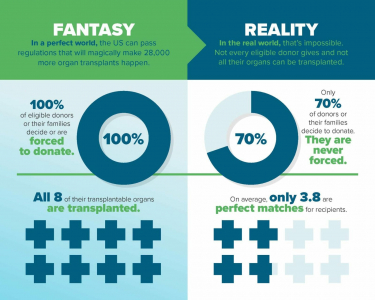Last year, President Donald Trump signed off on an executive order designed to improve kidney care in the United States. While it is an admirable goal, the executive order may have unintended consequences that could jeopardize thousands of transplant patients in Michigan as well as across the county.
The executive order outlined three main tactics: it emphasized the need for more effective and convenient treatments of kidney diseases; it sought to improve preventative care and educational programs designed to reduce the number of people who develop end-stage renal disease and it also sought to make more kidneys available for transplant by tweaking the way Organ Procurement Organizations evaluate and report their practices.
Gift of Life Michigan, like every other OPO across the country, lauds attempts to improve the health care system in ways that offer more hope and healing to additional people. This change, however, will not do that. The regulations as proposed were developed without input from OPOs or organ transplant experts; they are based on outdated or bad science and they will ultimately cause more harm than good.
We need your help.
First of all, the proposal is based on an inaccurate study that suggested as many as 28,000 organs are not transplanted every year due to breakdowns or inefficiencies in the current system. That figure, widely debunked, is based on the impossible premise that every person eligible to donate chooses to do so. There are far too many factors involved in the process to make that a practical metric. 
Secondly, the study cited underrepresents the number of organ transplants performed each year and incorrectly states that it is a stagnant number. Michigan alone saw more than 1,000 organs transplanted in 2019, part of a growing trend that has shown a 127% increase in transplantations over the past three decades.
The proposed metrics use data from death certificates as a measure for donation potential. Death certificates do not accurately reflect whether a patient was eligible for donation because they do not always document secondary health conditions that would make them ineligible, such as being COVID-19 positive or having metastatic cancer. A person must also pass away at a hospital, on a ventilator to become an organ donor. Death certificates would not reflect this information either.
Even if these thresholds are met, as many as 200 people — from the health care team to medical examiners to family members — can be involved in the decision to donate. The decision does not solely rest within the OPO.
The proposed rule would set an arbitrary bar that about 75 percent of OPOs would not be able to meet, subjecting them to decertification. That would destabilize the system, potentially leading to loss of lives.
The U.S. has the strongest transplantation system in the world. We have the highest transplant rate of any country, and our donation rate is nearly double that of Europe. Organ donation and transplantation has increased by nearly 50 percent across the country over the past seven years. Despite the near shutdown of transplantation in certain parts of the country due to COVID, 2020 is shaping up to be another record-setting year with more than 12,000 organ donors and 32,000 organs transplanted.
Even so, we know reform is needed. We support new technologies that will keep vital, life-saving organs viable for longer, so that we can get these gifts to more people who need them. We continually encourage individuals to join the Michigan Organ Donor Registry and encourage the incredible families of potential donors to say yes. We need to focus on making the entire system more efficient and productive, not just focus on OPOs.
How can you help?
We’re asking the Centers for Medicare and Medicaid Services (CMS) to collaborate with us to revise the proposal and identify accurate metrics that will reflect donation potential and actually produce positive improvements. Dozens of organizations involved in the donation process have outlined how this can be done.
You can join our campaign to encourage the Department of Health and Human Services (HHS) to address our concerns with proposed metrics. Simply submit an email to your elected officials. It is quick and easy and the pre-populated form letter can be personalized as you see fit.
Check out additional talking points about the issue at hand, and share with your friends and colleagues.
Drop us a line and let us know, and thanks for your support!








